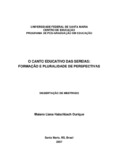| dc.creator | Ourique, Maiane Liana Hatschbach | |
| dc.date.accessioned | 2007-07-12 | |
| dc.date.available | 2007-07-12 | |
| dc.date.issued | 2007-04-13 | |
| dc.identifier.citation | OURIQUE, Maiane Liana Hatschbach. The educative sirens song: formation and plurality of perspectives. 2007. 84 f. Dissertação (Mestrado em Educação) - Universidade Federal de Santa Maria, Santa Maria, 2007. | por |
| dc.identifier.uri | http://repositorio.ufsm.br/handle/1/7202 | |
| dc.description.abstract | This work argues the relation unit-plurality from the formative proposal of the education. The education preserves - when aiming at an individual former of the world a vigorous relation with the transcendental thinking. So that, the school, place for excellence of the cultural formation (Bildung), is lost in the diagnosis of crisis of its function. Considering the new contours of the reason, acquired with the linguistic turn, this research is guided for the following question: it is possible still to keep the speech of the formation (Bildung) in the context of plurality of the perspective contemporaries who pass by the education? In the attempt to reintegrate the dimensions practical-moral and aesthetic-expressive with the reason, Habermas waves with the concept of a reason incorporated in communicative act. At the same time where he doesn t deny the conquests and the modern normative content, he delineates a situated reason, where the unit is the perspective of approach and not a condition given beforehand. With the pragmatic of the language, the pedagogical ends to link with the form to comprehend the knowledge and the subject in the education. The Habermas idea - of that it has a unit in the plurality - allows to understand the own project of the Bildung as plural. Thus, the totalitarian universality of the Bildung is retired to understand it as thought exercise. Therefore, this research concluded that it s not necessary to abandon the proposal of the Bildung to understand the different perspectives contemporaries who cross the education. These perspectives, sheltered in the different narratives of the quotidian, contribute in the understanding of the world, binding the circumscribed elements in the formative process | eng |
| dc.description.sponsorship | Coordenação de Aperfeiçoamento de Pessoal de Nível Superior | |
| dc.format | application/pdf | por |
| dc.language | por | por |
| dc.publisher | Universidade Federal de Santa Maria | por |
| dc.rights | Acesso Aberto | por |
| dc.subject | Formação (Bildung) | por |
| dc.subject | Unidade | por |
| dc.subject | Pluralidade | por |
| dc.subject | Educação | por |
| dc.subject | Formation (Bildung) | eng |
| dc.subject | Unity | eng |
| dc.subject | Plurality | eng |
| dc.subject | Education | eng |
| dc.title | O canto educativo das sereias: formação e pluralidade de perspectivas | por |
| dc.title.alternative | The educative sirens song: formation and plurality of perspectives | eng |
| dc.type | Dissertação | por |
| dc.description.resumo | O trabalho discute a relação unidade-pluralidade a partir da proposta formativa da educação. Ao visar um sujeito formador do mundo, a educação preserva em sua prática discursiva forte ligação com o pensamento transcendental. Neste sentido, a escola, lugar por excelência da formação cultural (Bildung), perde-se no diagnóstico de crise de sua função. Considerando os novos contornos da razão, adquiridos com a virada lingüística, a pesquisa norteia-se pela seguinte questão: é possível ainda manter o discurso da formação (Bildung) no contexto de pluralidade das perspectivas contemporâneas que perpassam a educação? Na tentativa de reintegrar as dimensões prático-moral e estético-expressiva à razão, Habermas acena com o conceito de uma razão incorporada no agir comunicativo. Ao mesmo tempo em que ele não nega as conquistas e o conteúdo normativo moderno, delineia uma razão situada, em que a unidade é a perspectiva de chegada e não uma condição dada de antemão. Com a pragmática da linguagem, os fins pedagógicos relacionam-se diretamente à forma de compreender o conhecimento e o sujeito na educação. A idéia de Habermas de que há uma unidade na pluralidade permite entender o próprio projeto da Bildung como plural. Desta forma, retira-se da Bildung sua universalidade totalitária para compreendê-la como exercício de pensamento. Por isso, a pesquisa concluiu que não é preciso abandonar a proposta da Bildung para compreender as diferentes perspectivas contemporâneas que atravessam a educação. Estas, abrigadas nas diferentes narrativas do cotidiano, contribuem na compreensão do mundo, ligando os elementos circunscritos no processo formativo | por |
| dc.contributor.advisor1 | Trevisan, Amarildo Luiz | |
| dc.contributor.advisor1Lattes | http://lattes.cnpq.br/2534601801498544 | por |
| dc.contributor.referee1 | Dalbosco, Cláudio Almir | |
| dc.contributor.referee1Lattes | http://lattes.cnpq.br/1671875455751185 | por |
| dc.contributor.referee2 | Tomazetti, Elisete Medianeira | |
| dc.contributor.referee2Lattes | http://lattes.cnpq.br/3942924352722374 | por |
| dc.contributor.referee3 | Bellochio, Cláudia Ribeiro | |
| dc.contributor.referee3Lattes | http://lattes.cnpq.br/8653053694824805 | por |
| dc.creator.Lattes | http://lattes.cnpq.br/3241620845064515 | por |
| dc.publisher.country | BR | por |
| dc.publisher.department | Educação | por |
| dc.publisher.initials | UFSM | por |
| dc.publisher.program | Programa de Pós-Graduação em Educação | por |
| dc.subject.cnpq | CNPQ::CIENCIAS HUMANAS::EDUCACAO | por |


